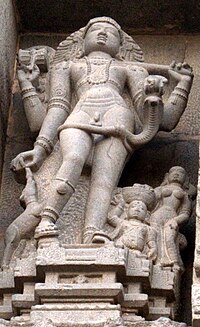Bhikshatana
| Bhikshatana | |
|---|---|
| God of ascetics | |

Bhikshatana, Annamalaiyar Temple, Thiruvannamalai
|
|
| Devanagari | भिक्षाटन |
| Sanskrit transliteration | Bhikṣāṭana |
| Affiliation | Aspect of Shiva |
| Weapon | Trishula |
| Consort | Mohini or Parvati |
Bhikshatana (Sanskrit: भिक्षाटन; Bhikṣāṭana; literally, "wandering about for alms, mendicancy") or Bhikshatana-murti (Bhikṣāṭanamūrti) is an aspect of the Hindu god Shiva as the "Supreme mendicant" or the "Supreme Beggar". Bhikshtana is depicted as a nude four-armed man adorned with ornaments who holds a begging bowl in his hand and is followed by demonic attendants and love-sick women.
Bhikshatana is considered a gentler form of Shiva's fierce aspect Bhairava and a gentle phase between Bhairava's two gruesome forms, one of which decapitates the god Brahma and the other of which murders the god Vishnu's gatekeeper. Bhikshatana is the form of Bhairava that Shiva assumes to atone for his sin of severing Brahma's fifth head. He wanders the universe in the form of a naked Kapali mendicant, begging for alms with Brahma's kapala (skullcap) as his begging bowl, until his sin is expiated upon reaching the holy city of Varanasi.
Another legend describes Bhikshtana's visit to the Deodar (Pine) Forest to dispense the ignorance of sages and lead them to true knowledge. During his visit, he seduces the wives of the sages who come to give him alms. Horrified by Bhikshatana's "heretic" appearance and actions, the sages have a long confrontation with him. Ultimately Bhikshatana triumphs, establishing the worship of the Linga, his aniconic symbol. A variant of the legend narrates how Bhikshatana transforms into Nataraja—Shiva as the Cosmic Dancer.
Bhikshatana is a popular icon in South India, in contrast to North India, where it is of lesser importance. Though Bhikshatana does not have any temples dedicated to him as the primary deity, he is sculpted in stone temple walls, worshipped as a subsidiary deity, and cast in bronze as a temple festival processional icon in almost every major Tamil Shiva temple. Many Tamil language hymns sing of Bhikshatana's wanderings, often narrating of the pining of the love-smitten who are enamoured of him.
...
Wikipedia
